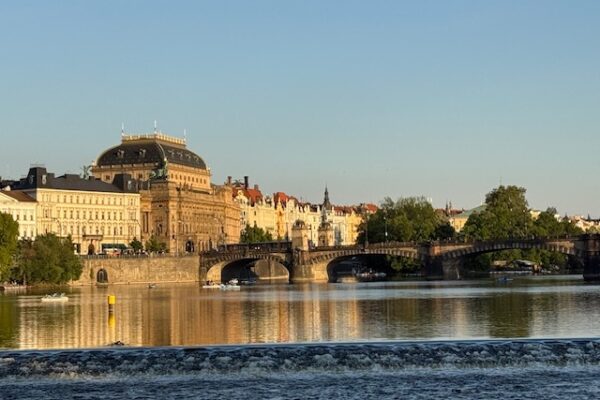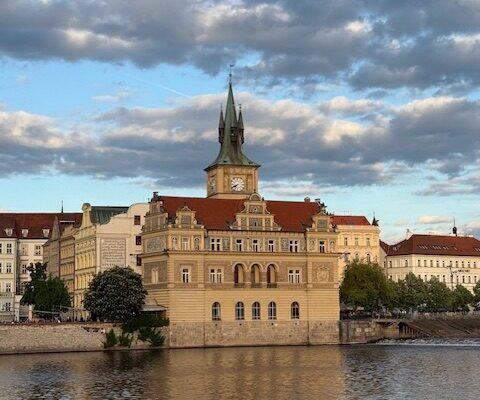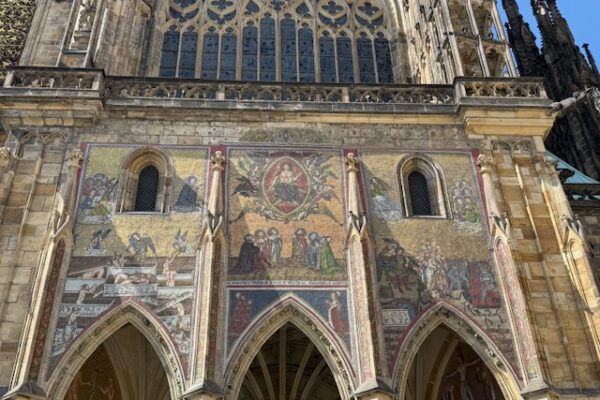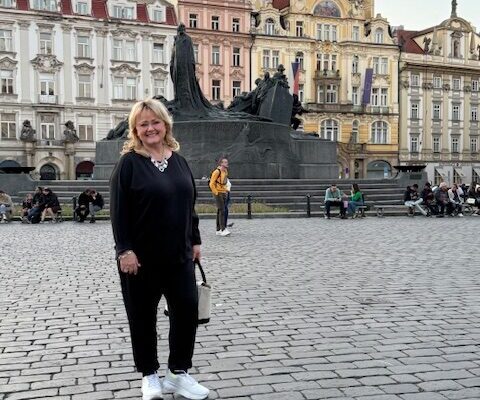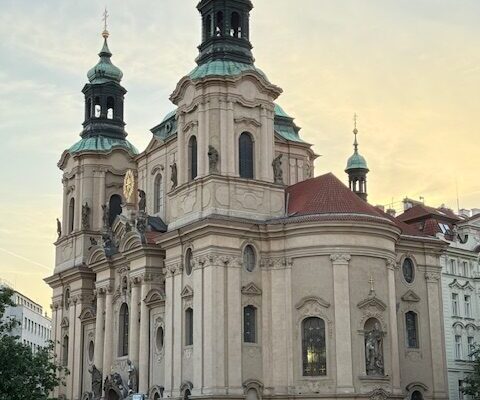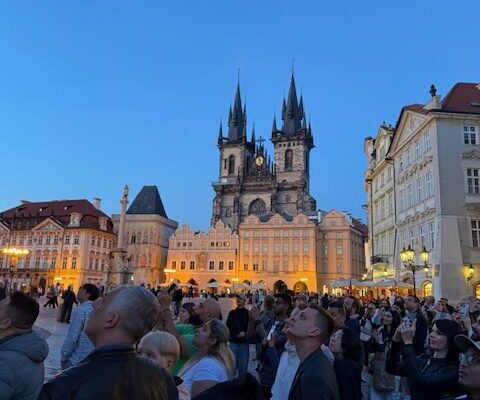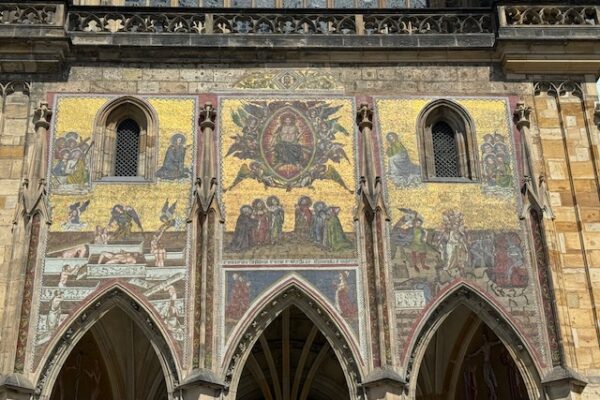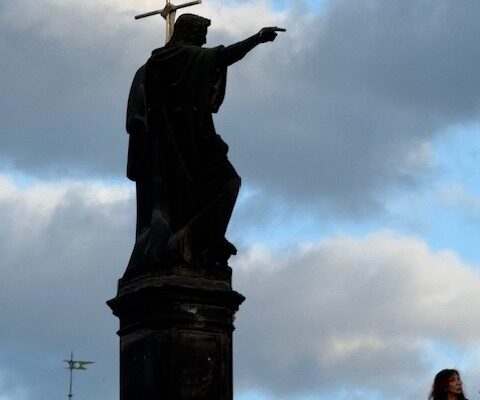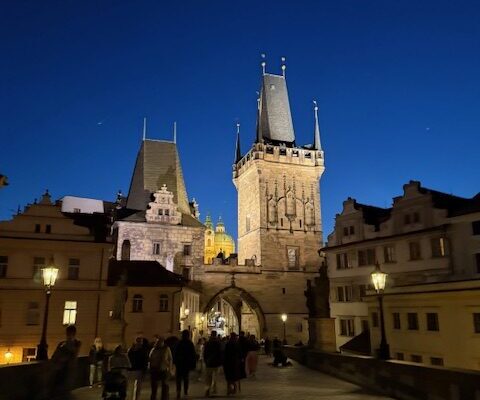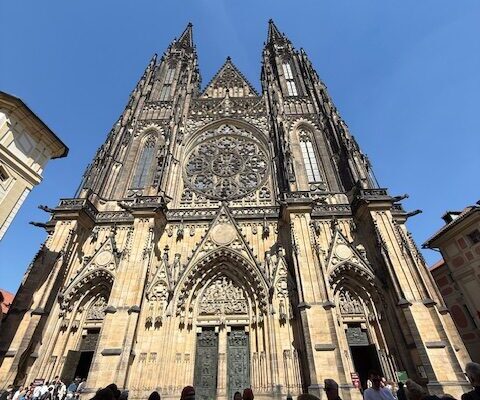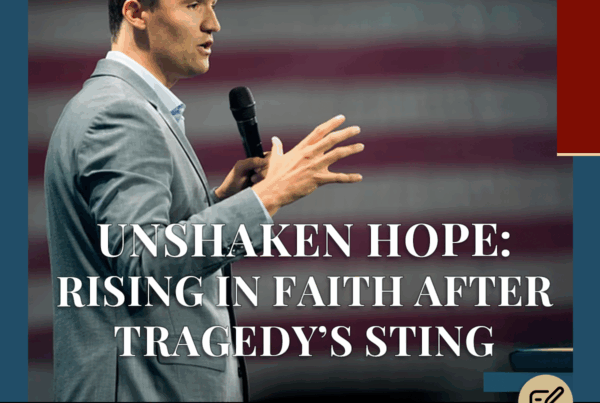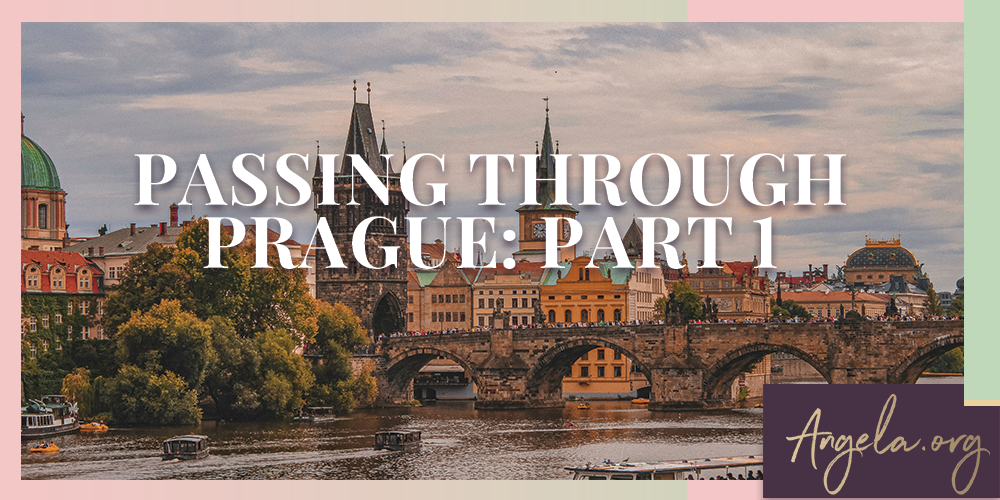
 As Kenneth and I journeyed through the enchanting streets of Prague this week, I found myself marveling at a city woven with history, art, and faith—a city that whispers tales of sacrifice and spiritual awakening. Now, on a six-hour train ride to Krakow, Poland, and another 2 1/2 hour bus ride to Wisla, to speak, and sing at the European Leadership Conference, I am reflecting on the profound impact Prague has had on Christian and Jewish history and the courageous men and women who shaped it. In part two, I will share about more of our travels and how I (accidentally) crashed a church party.
As Kenneth and I journeyed through the enchanting streets of Prague this week, I found myself marveling at a city woven with history, art, and faith—a city that whispers tales of sacrifice and spiritual awakening. Now, on a six-hour train ride to Krakow, Poland, and another 2 1/2 hour bus ride to Wisla, to speak, and sing at the European Leadership Conference, I am reflecting on the profound impact Prague has had on Christian and Jewish history and the courageous men and women who shaped it. In part two, I will share about more of our travels and how I (accidentally) crashed a church party.
Prague, affectionately known as the “City of a Hundred Spires,” is a living testament to resilience. Its architecture—a stunning blend of Gothic, Baroque, and Romanesque—tells stories of divine beauty and human perseverance. The city is dotted with over 100 parks, gardens, museums, and galleries, each offering a glimpse into its layered past. As the sun dips behind the spires, casting a golden glow over the Vltava River, I am captivated by how this city has endured centuries of upheaval, standing firm in its faith and cultural identity.
Walking through Prague feels like stepping into a living history book. Every corner reveals a new chapter—whether it’s the majestic Prague Castle, the intricate facades of Old Town’s churches, or the ancient Jewish cemetery whispering stories of faith’s endurance. But beyond its breathtaking beauty, Prague’s true spiritual heartbeat is embodied in its heroes of faith—most notably, Jan Hus.
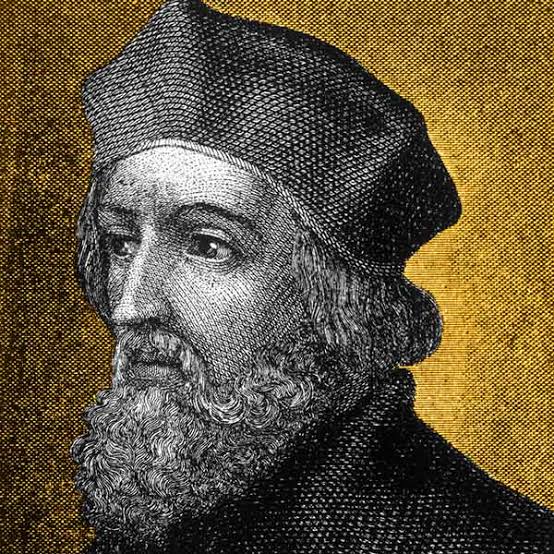
Jan Hus
Jan Hus: A Beacon of Faith and Reform
Jan Hus (circa 1369–1415) stands as one of the most pivotal figures in Christian history, whose life and martyrdom laid the groundwork for the Protestant Reformation centuries later. As a Czech theologian and reformer, Hus was driven by an unwavering commitment to biblical truth and moral integrity. His critique of ecclesiastical corruption and his emphasis on preaching in the vernacular inspired countless believers and theologians—an enduring testament to the power of faith rooted in Scripture.
Ordained as a priest, Hus boldly challenged the sale of indulgences and the moral laxity of the clergy. His sermons at Prague’s Bethlehem Chapel emphasized salvation by faith alone and the priesthood of all believers—ideas deeply rooted in the teachings of John Wycliffe. In his seminal work, De Ecclesia, written in 1413, Hus declared, “The true church is the congregation of the faithful,” a radical departure from the hierarchical dominance of the time. His unwavering stance made him a target of the church’s wrath.
Hus’s defiance led to his excommunication and, ultimately, his tragic death. Summoned before the Council of Constance, he was promised safe conduct but was betrayed and burned at the stake in 1415—an act of martyrdom that ignited the Hussite movement. His death became a testament to his conviction: “Truth prevails.” His sacrifice proved that standing for the Gospel, even unto death, is the highest form of witness.
The Impact of Hus’s Faith and Legacy
The life of Jan Hus is a shining example of faith’s courage. His unwavering commitment to biblical authority and moral integrity inspired countless reformers. Martin Luther, the father of the Protestant Reformation, famously reflected, “I was overwhelmed with astonishment when I read Jan Hus; I could not understand how a man so holy could be burned.” Luther credited Hus with planting the seeds of reform, noting that his critiques of indulgences and church corruption echo through Luther’s Ninety-Five Theses.
Similarly, John Calvin praised Hus’s “boldness in contending for the truth,” recognizing his martyrdom as a catalyst for challenging papal authority. Modern theologians like J.I. Packer have lauded Hus’s emphasis on Scripture, calling him a model of faith that demands courage to confront corruption and trust in God’s Word. C.S. Lewis, in Letters to Malcolm, referenced Hus’s moral courage, stating, “Men like Hus show us that faith is not mere assent but a lived conviction, even unto death.”
Hus’s legacy endures as a testament to the transformative power of conviction. His life, as Luther, Calvin, Packer, and Lewis affirm, not only shaped the course of the Reformation but continues to inspire believers today to pursue truth relentlessly, anchored in Scripture and unwavering in moral integrity.
Prague’s Religious and Artistic Heritage
Prague’s religious landmarks are monuments not just of architecture but of spiritual perseverance. The Prague Castle complex, with its Gothic spires and the breathtaking St. Vitus Cathedral, stands as a symbol of faith’s enduring presence. The city’s Old Town Square, with its lively markets and historic buildings, is the heart of cultural life—centered around the statue of Hus, which reminds visitors of a man who dared to defy the powers of his day.
Beyond its religious significance, Prague is a city alive with artistic expression. Mozart’s Don Giovanni premiered at the Estates Theatre, and the city’s musical legacy continues through festivals celebrating Dvořák, Smetana, and Kafka. Its museums and galleries showcase centuries of creativity, resilience, and faith—testaments to a city that has weathered wars, upheavals, and ideological shifts.
A City of Enduring Faith and Transformation
Prague’s story is one of resilience—of a city that has endured centuries of conflict yet remains a beacon of hope. Its streets whisper stories of those who sacrificed everything for the Gospel, inspiring us to stand firm in our faith. The city beautifully balances its ancient charm with a vibrant, modern spirit—a place where faith and creativity continue to flourish side by side.
Reflection: A Call to Courage and Truth
As I prepare to leave Prague and head into new adventures, I am inspired anew by Hus’s unwavering stand for truth. His life challenges us to remain steadfast in our faith, to confront injustice with courage, and to trust in the Lord’s sovereignty. Hus’s sacrifice reminds us that, like him, we are called to be witnesses—boldly proclaiming the Gospel, even when it costs us everything.
This journey through Prague has deepened my appreciation for the enduring power of faith—faith that calls us to sacrifice, to seek justice, and to proclaim the Gospel boldly. As we reflect on the life of Jan Hus, let us remember that standing for truth is a divine calling—one that echoes through eternity. May we, too, be willing to lay down our lives for Christ, trusting that His truth will ultimately prevail.
Prague is not just a city of stunning architecture and rich history; it is a sacred reminder that faith, sacrifice, and resilience are the hallmarks of those committed to Christ. As I leave this beautiful city, I carry with me a renewed passion to live out the Gospel boldly, inspired by the legacy of those who dared to stand and suffer for truth.
P.S. Announcement! the Amazing Life Gospel Choir has been invited to join the Prom Praise gathered choir in June 2026 and We Need Your Help
To shine God’s light on these world-class stages, we need to raise £4500 ($5,900) cover travel, music arrangements, and performance costs. Your generous gift will keep our choir accessible to all and help us share the Gospel far and wide.
Will You Be Part of Our Song?
Every donation, no matter the size, fuels our mission to spread faith, hope, and love. Give today and help us carry the Gospel through song.
Please support us through our GoFundMe page. Thank you for your prayers and support.
If this message resonates with you, I encourage you to Insta-share it with a friend.
Insta-share it on Instagram!
Screenshot your favorite section and tag me [@AngelaMackenzie___] so I can see and share your post! Let’s keep the conversation going and strengthen each other in faith!
